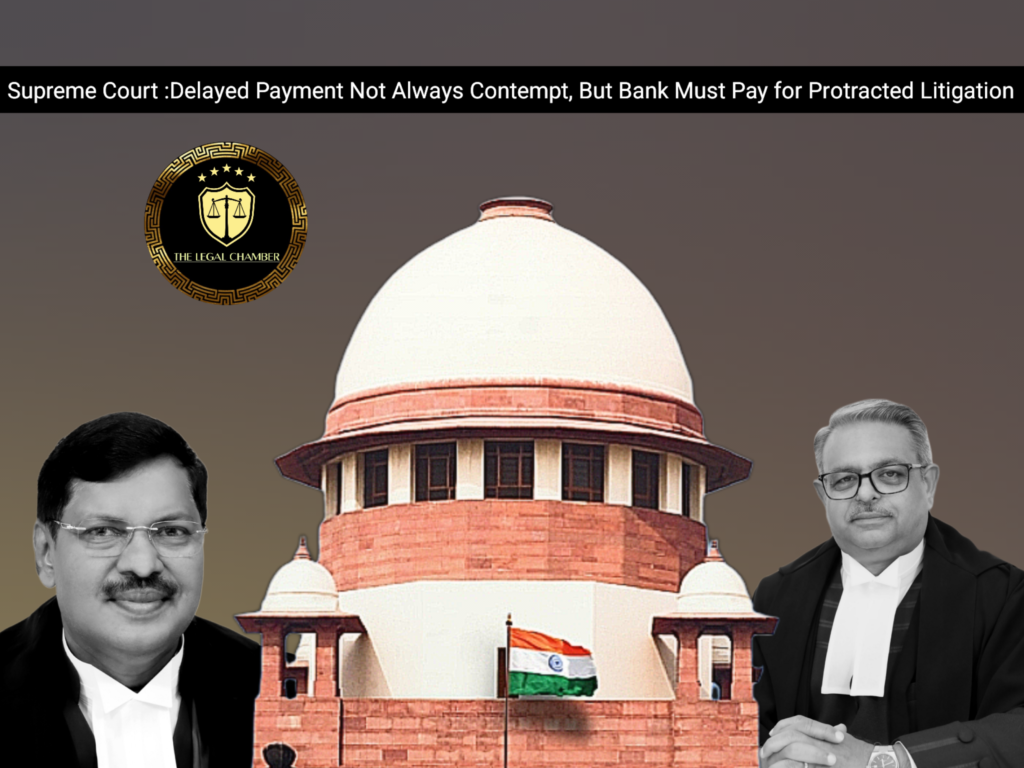The Supreme Court declined to initiate contempt proceedings, finding the delayed payment of dues, while a violation, was not wilful. It reinforced that contempt jurisdiction cannot be used to adjudicate new claims like pension, which were not part of the original decree. The Court, however, awarded compensatory costs for the protracted litigation.
Facts Of The Case:
A.K. Jayaprakash, a manager at Nedungadi Bank Ltd., was dismissed from service in 1985 on grounds of alleged irregularities in sanctioning loans and delays in reporting. He challenged this dismissal under the Tamil Nadu Shops and Establishment Act, 1947. The Deputy Commissioner of Labour initially set aside the dismissal and ordered his reinstatement. This decision was repeatedly challenged by the Bank, first in the Madras High Court, which remanded the matter, and later in appeal. Ultimately, the High Court upheld the reinstatement but limited the back wages to 60%.Following a merger, Punjab National Bank became the successor and filed appeals before the Supreme Court. In January 2018, the Supreme Court dismissed the Bank’s appeals and directed it to release the “outstanding amount” to the employee within three months. As this directive was not complied with in the stipulated time, the employee filed contempt petitions. During the pendency of these petitions, the employee passed away, and his legal representatives were brought on record. The Bank subsequently released the provident fund and gratuity dues but denied pensionary benefits, leading to the final hearing on the alleged wilful disobedience of the court’s order.
Procedural History:
The procedural history of this case commenced before the Deputy Commissioner of Labour under the Tamil Nadu Shops and Establishment Act, 1947, which set aside the employee’s dismissal and ordered reinstatement. This decision was challenged by the Bank in the Madras High Court, which remanded the matter for a fresh decision on the specific issue of delay.Upon remand, the Deputy Commissioner again ruled in the employee’s favour, a decision subsequently upheld by a Single Judge and later a Division Bench of the Madras High Court. The Bank, now Punjab National Bank following a merger, pursued a final appeal to the Supreme Court. The Supreme Court dismissed the appeals in 2018 but directed the payment of outstanding dues within three months.Alleging non-compliance with this directive, the employee initiated contempt proceedings (Contempt Petition (Civil) Nos.1002-1003 of 2023) before the Supreme Court, which were disposed of with the ruling that the delayed payment did not constitute wilful contempt, but awarding compensatory costs to the legal heirs.
READ ALSO :Supreme Court Rules :Landowners Can’t Get Uniform Compensation for Power Lines
Court Observation:
In its observations, the Court noted that while the respondent-Bank had violated its explicit directive to pay the outstanding dues within three months, the delay did not constitute wilful disobedience necessary for contempt. It reasoned that the administrative difficulties arising from a bank merger and retrieval of legacy records, while not justifying laxity, negated the essential element of mens rea or contumacious intent.Furthermore, the Court firmly established that contempt proceedings cannot be used as a forum to assert new substantive claims, such as pensionary benefits, that were neither adjudicated upon nor granted in the original decree. However, acknowledging the inordinate delay and protracted litigation spanning decades, the Court exercised its inherent jurisdiction to award lump-sum compensation to the deceased petitioner’s legal heirs to achieve complete justice and bring a quietus to the matter.
Final Decision & Judgement:
The Court disposed of the contempt petitions and discharged the rule against the respondents, holding that the delayed payment, though a violation, did not amount to wilful contempt. It explicitly rejected the claim for pensionary benefits, stating it was not part of the original decree and thus not enforceable in contempt proceedings. However, recognizing the protracted litigation and inordinate delay in disbursing lawful dues, the Court exercised its inherent power to do complete justice. It directed the respondent-Bank to pay a compensatory sum of ₹3,00,000 to the legal representatives of the deceased petitioner within eight weeks, failing which it would attract interest at 8% per annum. This direction was issued to provide solace for the long hardship and to bring a final quietus to the four-decade-old dispute.
Case Details:
Case Title: A.K. Jayaprakash (Dead) Through LRs vs. S.S. Mallikarjuna Rao & Anr.
Case Number: Contempt Petition (Civil) Nos. 1002-1003 of 2023 (in the referenced Civil Appeal Nos. 6732-6733 of 2009)
Date of Judgement: August 19, 2025
Judges/Justice Name: Justice B.R. Gavai and Justice Augustine George Masih
Download The Judgement Here
